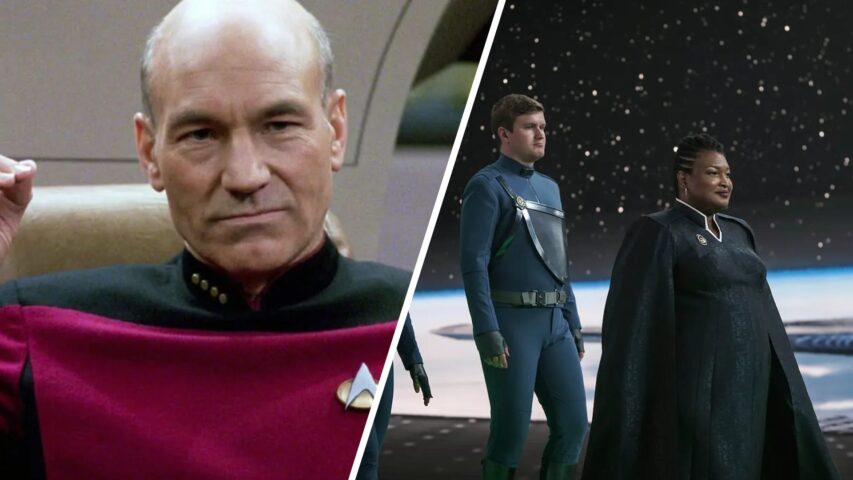Every week, Substack helpfully compiles a list of posts that might be of interest to me, like this one by Isaac Young, discusses the fading phenomenon of Star Trek. (Disclaimer: I was a huge fan of the original TV series, but stopped watching the various Star Trek TV shows late in the Next Generation era and haven’t seen much after that … this essay covers parts of the canon that are largely terra incognita for me.)
In order to understand what a thing is, I believe you must first understand how it dies. Endings are the most important part of a story because they are the culmination of everything that came before. They dictate the legacy and the memory. It is through the ending that we can finally put the body of work in its proper context. What is Romeo and Juliet if we cut the final act out, and can you really understand the play if you stop just before their suicide? So therefore, in order to understand this franchise, I have to begin this essay with Star Trek‘s suicide.
Whatever we make of the heroism of James T. Kirk, the high-minded principles of Jean-Luc Picard, and the reactionary realism of Benjamin Sisko, we have to come to grips with the tragic reality that those things did not last. They were discarded for feminism, queerness, and diversity. And what do those things mean? Modern Star Trek has been quite clear about that. It’s about emasculated men and raging girlbosses. It’s about celebrating every sexual appetite except the one that produces functional families. It’s about fetishizing racial revenge and elevating mediocrity at the expense of excellence.
You’ll find Star Trek has never been more vulgar, more profane, more debauched. It’s small-minded in everything from the cast to production values to the storytelling. It’s about lecturing to the untouchables about their privilege and holding victimhood as the highest virtue. All those tiny elements which we ignored or snickered at in previous shows became the substance of their successors, while those parts we loved about Star Trek — the parts that made it great — were left behind or turned into nostalgia-bait.
The awkward reality of being a normal person from twenty years ago is that every franchise and IP has stabbed you in the back — viciously. And yet despite this, I still harbor a great love for the films and tv series of yesteryear. If I hadn’t, I wouldn’t be writing this essay. It is out of a great sense of love and admiration that I am dedicating this piece, and that is how I want readers to understand my review. I’m not here to tell you Star Trek was evil or anything like that. I’m here to tell you that Star Trek was great — brilliant even, but the rot was there from the beginning.
Looking back, what should I say was the core of Star Trek? Or rather, what was the nature of Star Trek? Was it in those ephemeral elements which turned out to only be in passing? Or was it those elements which had been there from the beginning, and are only now being noticed, like flesh peeling away to reveal the bones of a rotting corpse? And to continue this metaphor, what should I make of this bloated, festering body when its soul has clearly long departed?
But how can I judge old Trek for the new? How can I possibly analyze this franchise with this lens when it has clearly fallen to ideologically captured writers? Surely this once beloved series will course correct once Hollywood hears all the negative feedback from fans.
I don’t know who still believes that anymore, but I feel obligated to address this criticism for that one person who still doesn’t understand how we got here. The world didn’t suddenly turn crazy in 2016. Wokeness is not an aberration or an anomaly, but the logical endpoint of liberalism. It is egalitarianism, personal freedom, and materialism taken to their natural conclusions. It is Star Trek‘s values as they actually operate in the real world.
I can look at franchise, see it as a product of the Left, and reliably chart its degeneration through understanding those values and their decline. Star Trek isn’t bad because it fell to a bad writer’s room or predatory corporate interests. It’s bad because we’re currently in a culture-wide crisis that is affecting every form of media entertainment.
If there is one thing I want to get across in this essay, it’s that what we’re witnessing is the real Star Trek as it springs from its stated values. This is the most honest the series has ever been. Once you strip away the Shakespeare, the heroic characters, the sci-fi concepts, the witty banter, and all the moral framing, this rot is what you’ll find underneath. It’s always been there. The bad news is that Star Trek as the political propaganda it has always been is quite ugly. The good news is that those things which made Star Trek great, those things which reached for the good, the true, and the beautiful—those things are eternal. And they aren’t going to die with Star Trek.






